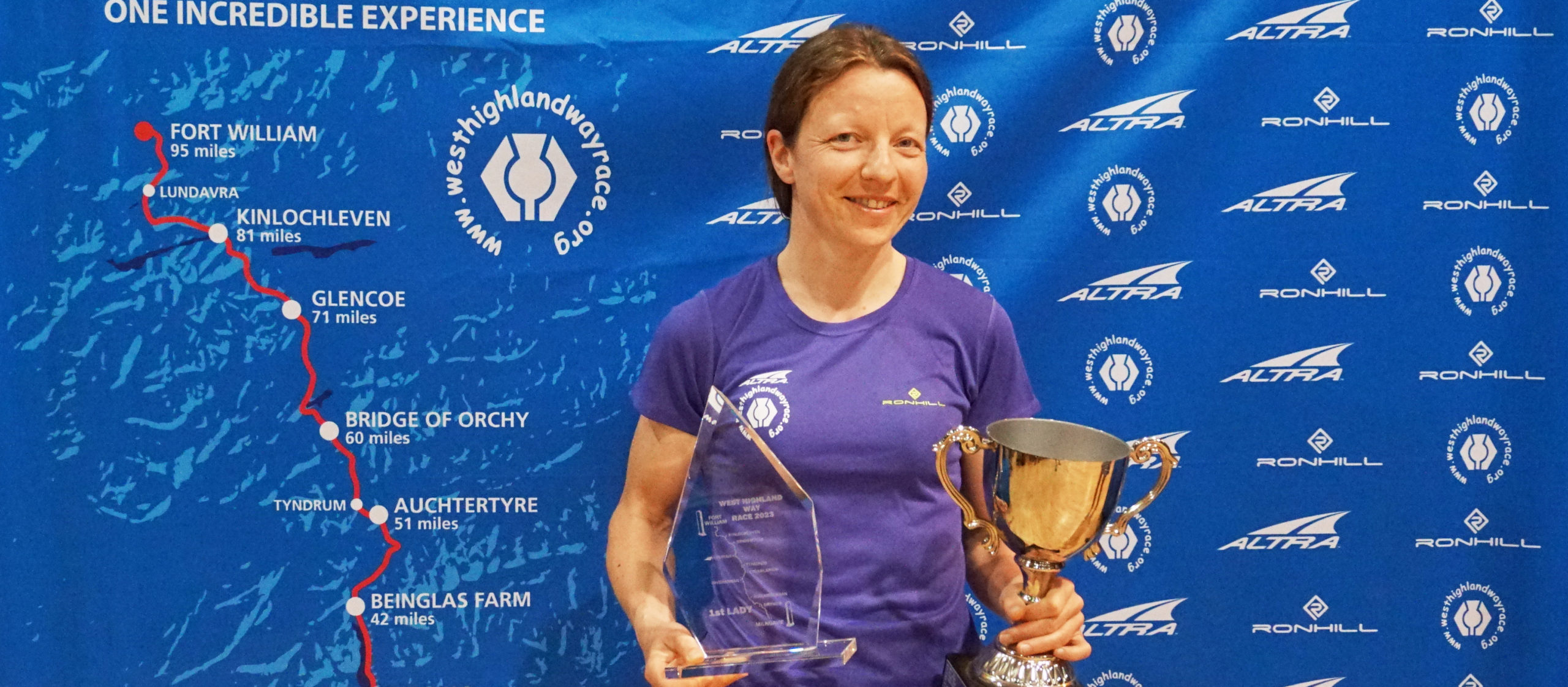Last weekend , Alison McGill was the women’s champion at Scotland’s iconic West Highland Way race. I talked to her on Monday after the race to hear her race story.
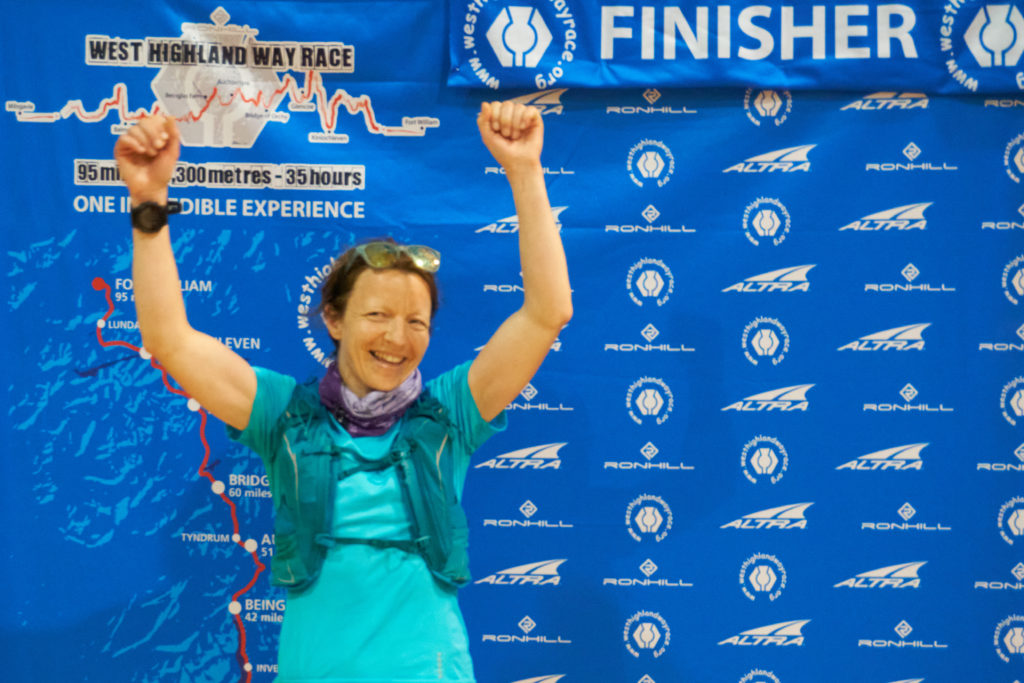
That winning feeling Pic Shyamala Stott
Full Details of the event with 2023 results link can be found HERE
AS. For people who may not know much about your background, briefly describe how you got into running and how you got into ultras. How have you been led astray into the ultra world?
AM. I started running from a very young age. The sport has always been a big of my life because Mum and Dad ran and also my aunties and uncles from both sides of the family ran too. My family were all members of Irvine AC or Irvine Cable as it was called at the time, and i was coached by Willie Banks who had a big influence on my running career. I had a couple of years break from running during secondary school, due to some knee problems, but started training and racing again when i started at Strathclyde Uni, where i joined the uni team for road and cross-country events.
My first road 10k was in 2002, the year before i graduated. Back then the results were issued in the Evening Times newspaper, which was quite exciting scrolling for your name in tiny print! That was my first taste of the longer distances rather than the 800 metres, long jump and all the things you do as a junior at a club. It was the Glasgow Women’s 10k that used to start in Bellahouston Park in Glasgow.
Later that year i entered the Glasgow half marathon, which went hand in hand with the Women’s 10k and a natural progression. My mum trained me for my first half and she also raced too, which was her first half for a number of years. I continued with the Women’s 10k and Glasgow half for a few years and began to enter other distance races too. Later, when I moved to Fife for work I joined Fife AC. I was a little apprehensive about joining the club, knowing how speedy and impressive the athletes were, particularly in the women’s group, but i’m glad i did and was made very welcome. That’s when I met Ron and the girls. (Writers note. Ron is Ron Morrison, leading endurance coach at Fife AC) When I joined Fife I tried a few hill races, and although I enjoyed I kept falling and hurting myself due to a lack of skills and strength on the trails. It put me off a little bit so I stuck to the road for quite a long time. My first marathon was London Marathon in 2016. Following that I went through quite a spate of injury and disappointment, though I did manage to win the Stirling Marathon in 2018 the year it was the Scottish Championship.
The first ultra was Glenbogle 33 in 2016, and although i continued with the shorter distances on road, I couldn’t forget the buzz i got from the longer trails. I loved it, and that was me hooked on the trails. The next ultra race I ran was The Devil in 2019,( 43 mile Devil o the Highlands) this is still one of my favourite races as it’s such a beautiful course and a great atmosphere. By then The West Highland Way race had been in my sights for a couple of years already, and with my ultras races was fortunate enough to get an entry into the 2020 race. Then covid hit, and all racing went out the window.
AS. Like many people who got entries, it was a little bit frustrating but everyone was running miles and miles through lockdown anyway. Then, in 2022, the race happened. You ran and finished fourth in 19 hours 58 minutes42 seconds. Many people would be delighted with getting sub-20 in their first effort, but looking back, how did you view that race?
AS. I remember Ian Beattie asking after it, did you enjoy it?
Like most, I had been looking forward to it for a couple of years and unfortunately on the day due to a number of factors I struggled to enjoy it. I had run well at the Anglo-Celtic plate in early April at Perth. I think I probably had the best race of my life there. The West Highland Way was eight weeks after the 100k. After all the road work for the 100k, I tried to cram in the hills and trails between then and the West Highland Way. In my head, I thought I was more ready than I was, but I wasn’t ready for it at all. So I went in with the wrong mindset into that race and unprepared. I took it too seriously, and things didn’t work out as well as planned.
AS.Do you think you gave it enough respect? A lot of people move from 50-mile races up to 100 miles or the West Highland Way. Some of them certainly don’t give it enough respect. Do you think, in hindsight, it needs a bit more respect than people think?
AM Yes. I certainly didn’t give the course enough respect. The sections alone are mostly runnable, however when you piece them all together; add in the night running, nutrition, kit, and unpredictable weather, it becomes a whole different challenge.
AS It is challenging, but it didn’t put you off.
AM. Not at all, the challenge is what i love most about ultra. Because I had made that many mistakes, I thought I have to resolve this and work out what I could do better. So that’s what drove me on.
AS. In that 12 months, did you prepare any differently for this year’s race?
AM. I know it’s always been my mental side that’s my weakest. I’ve always looked up to runners like Debbie( Consani) and Jo (Wilson) who have a very positive mindset and run through races smiling. I was in awe and wondered, “How can they smile through things when things get tough?” So I worked on my mental skills and found some good resources which I practised during all my training runs. With practice they have become second nature. For me, the biggest difference now is coping when you’re getting tired, and things are getting tough. Thankfully i was able to apply new skills learnt to the race at the weekend.
AS. So your training didn’t change very much. It’s more just a mindset in some ways.
AM. Yes, staying positive and relaxed.
AS. I know your buildup didn’t go smoothly this year because you were selected for the Anglo-Celtic Plate again in April but then had to pull out with an ankle problem. You Probably lost around a month’s training.
AM. Yes, at least four weeks of training.
AS. So you then had to more or less get back into things from about mid-April through to early June. You had about six or seven weeks to get back on track.
AM. I had a 12-week, 100-mile programme that I’ve used before, which I knew worked well and physically i was able to manage. I had to squeeze it and compress it into ten weeks, however. I thought this could go either way. It could work, or it could go really wrong and set me back again. I went for it and whilst still being cautious, managed to achieve every week as scheduled. That’s all I could ask for, and it went well.
AS. Backtracking on training because several people like these little trivia questions. What was your longest run building up to this year’s race?
AM.I had a weekend in May when I based myself in Tyndrum. On the Saturday, I ran Tyndrum down to Beinglass and back. Then on Sunday, I ran up to Glencoe and back down to Tyndrum. It’s what I wanted to achieve. To get to that point where I thought, yes, my ankle’s okay, and things are feeling fine. This is going to work.
AS. Do you advocate back-to-back runs or doing back-to-back runs occasionally in conjunction with weekly long runs?
AM. Every weekend i ran a back-to-back runs, increasing the time each week. Back-to-back runs don’t suit everyone but i just really enjoy them. I also do mid-week runs, but I also like doing a steady state run where for example you’re doing a two-hour run, but within that you include two 20-minute tempo efforts. You are feeling tired but you are not quite at your peak. It’s comfortable and enough to get your heart rate working without red lining.
AS. As well as incorporating these Mini Tempos in your long runs, do you do any other speed sessions or hill reps during the week?
AM. Compared to marathon training, I do less speed work for ultra. Alongside the increased volume each week, i find it takes me longer to recover from a speed session. I found that just once a week works well for me. It’s all my body can manage. I have found that when I’ve gone to race, it hasn’t made that much of a difference. I’ve still got some basic speed and base there.
AS. How long do you taper for? What’s your classic taper for a West Highland Way or 100-mile distance?
AM. I changed my taper after hearing advice through a podcast recently. They suggested after your final big peak week, 3 weeks out, you take a really easy week. After that, in the two weeks before the race, you start building it back up again. So you’re allowing your body to adapt to the higher volume by the rest, but then letting it know it’s not quite ready to relax and take things easy yet! I also made sure I wound down a bit mentally during taper, which meant i wasnt feeling exhausted and stressed.
AS. Do you have a coach?
AM. Not at the moment. Self-coached, yes.
AS. Obviously, that doesn’t seem to do you any harm. You’ve had times when you have been coached. Do you think you’ve just learned from experience to listen to your own body better?
AM I do love the planning that goes into a big training block towards a race, and as mentioned earlier it’s fun to figure out what went wrong previously and apply the changes. I keep a daily journal which allows me to look back at previous training.
There are some downsides to self-coaching, but yes I have learned from experience to know what works, and ensure i listen to my body and allow flexibility in my schedule.
AS So, coming into the race, describe your feelings in Milngavie on the start line just before he set off.
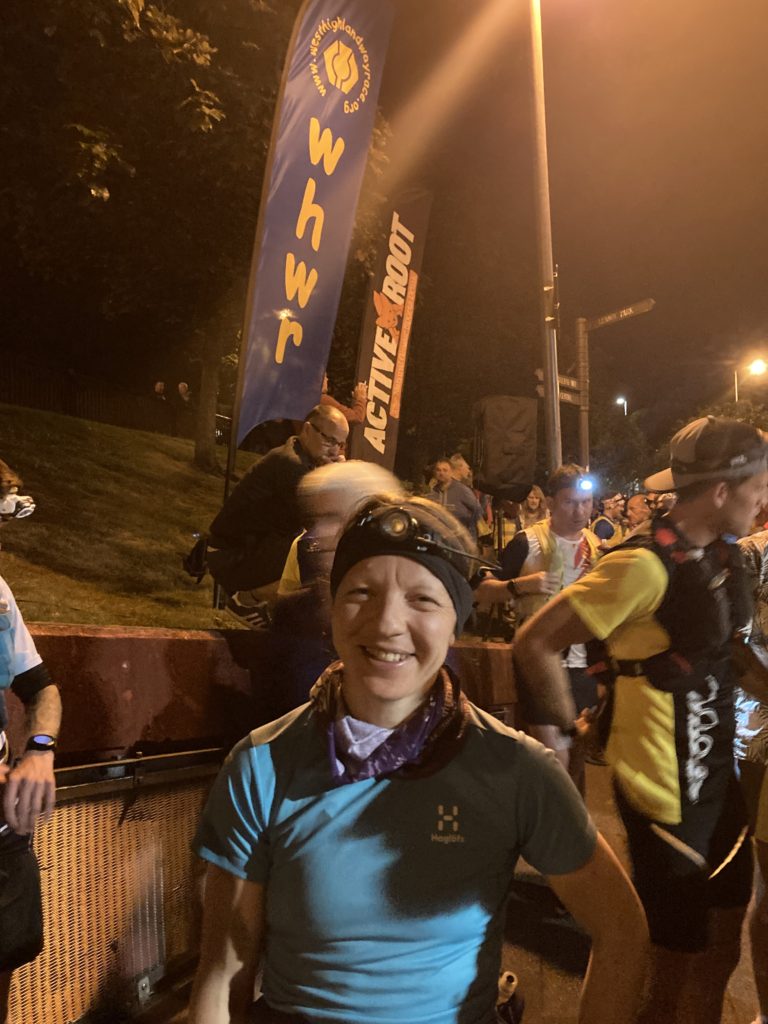
AM. I tried to stay relaxed, but I still had enough nerves to have that adrenaline at the start line. I think last year I remember feeling nervous to the point where I was anxious, so things turned the wrong way. This time I kept it quite level and had a good, calmer mindset.
AS. As the race unfolded, how did you approach the first 10 miles up to Drymen and settle into the race?
AM. I went maybe 10-15 seconds per mile quicker than planned. Looking back, I probably would have still done the same. I was comfortable. I wasn’t breathing heavily, my legs were quite happy, and I was just settling in. It takes me maybe two or three hours to warm up and get into a race now. I was happy and I was watching the sunrise come up. It was just so nice and was grateful to be on the trail.
AS. Did the sun rise before Conic Hill? Everyone talks about the experience of going over Connic Hill round about sunrise and seeing Loch Lomond for the first time. Did the sunrise before Connic Hill?
AM Yes. There was a bright red sky on my right-hand side. I was able to take in my surroundings as I wasn’t too deep into it. It just relaxes you a little bit.
AS. I think I’m right in saying that by this time, you were in the lead at Balmaha as First Lady. Were you aware of that, or were you just running your race?
AS. I wasn’t aware at all at first. I was aware that Saki was just ahead of me through the forest after Drymen. Then I passed her, but because you start in the dark, I didn’t know who was ahead or behind. I didn’t know I was in front until my crew told me.
AS. You were in front there and right through to the finish. Were you able to relax into the race without having to bother about wondering how far behind Saki or someone else was? Or were you thinking about running your race throughout?
AM. So, for the first half, I didn’t want to know that early on and tried best to stay focused. I had a few falls along the lochside so needed just to chill a wee bit and concentrate on getting to each check point. I thought, just run the course and the conditions. When I did ask, the info i asked for was the gap. The other girls are such strong and consistent runners i knew they wouldn’t be far behind.
Initially, it was maybe 30 minutes and then 40 minutes, and I still thought “That’s kind of a little bit close for a 100 miler,” so I couldn’t switch off as they say the race only begins at 80miles! To try to maintain the gap i ran a bit harder on the flatter more runnable sections but just kept working and moving forwards.
AS. What was the point in the race when you finally thought, “Hey, I’m going to win this”
AM I think, on the last stretch from Kinlochleven over the Lharig Mhor to Lindavra. I ran that quicker than I thought I would. There was a nice breeze behind as well, which helped. At that point I thought, “I’m still moving well and feeling good…just don’t get carried away and fall over”. Reaching the big gate at the end of the long stretch, and then finally Lundavra was a big relief.
AS. Obviously, you get close to Fort William and come down the fire road, and then you hit the tarmac for the last two or three miles. What was going through your head as you got closer to the finish line? What were your feelings when you crossed the line?
AM. When I finally got to that fire track, I was just smiling because all I was thinking about all day was picturing myself running down the fire road. It ended up longer than I had remembered though and the big chuckies were an added bonus. I knew that when i reached the road to Fort William all i had left to do was to run up the big stretch up towards the town, cross the road when it was clear, and head for the station. As i turned towards the carpark the adrenaline kicked in and i could breathe a huge sigh of relief.
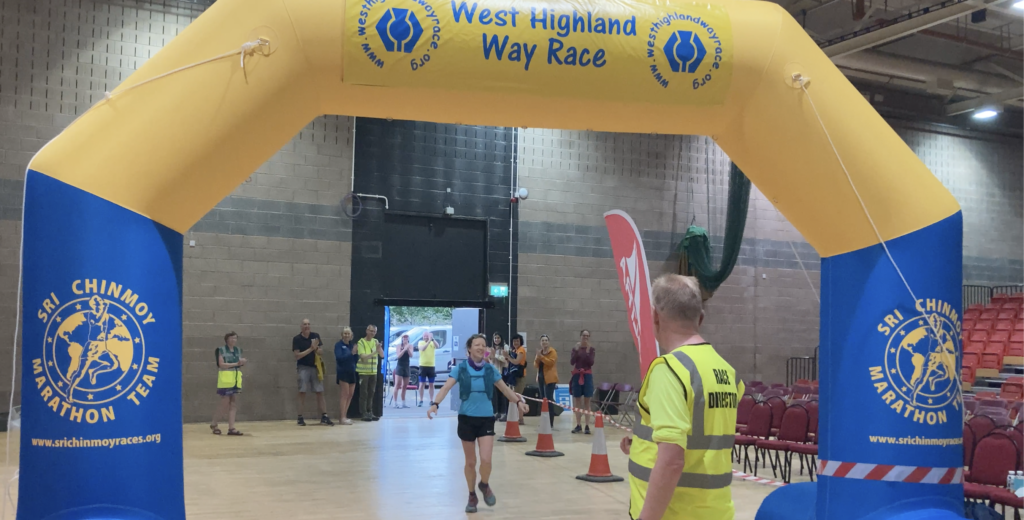
Alison McGill winning the 2023 West highland Way race Pic Adrian Stott
AS. It’s a fabulous run. You improved by almost an hour on the year before. What were your first impressions? Also, did you manage to sleep that night? Or were you just too sore to sleep?
AM. Yes! I slept. I went straight out like a log for several hours. When I woke up my head was buzzing, so I got up and went for a wander to stretch my legs and check all was ok.
AS. In any 100 milers, crew and support are so important. I think it’s fair to say that the organisers of the West Highland Way put a huge emphasis on support crews being an integral part of the whole race. Getting them involved in the big family feeling. How important was your support, and how did your support work?
AM. The support worked like clockwork from the start. Things were calm at each check point, which meant it was controlled. There was no kind of drama. There was nothing that upset us. It just really worked, and communication was there. There’s nothing negative I can say about it, but it is a huge part, I know now, of the race.
At times I was running for hours and hours on my own, but I knew my crew were just around the next corner, and I’d see them. Knowing your crew are always ahead and there to help you with anything at all takes a lot of worry away, and helps you to relax and keep happy.
( Note Ally had a crew of three,. Her sister Kath, and Shyamala and Dhavala Stott.)
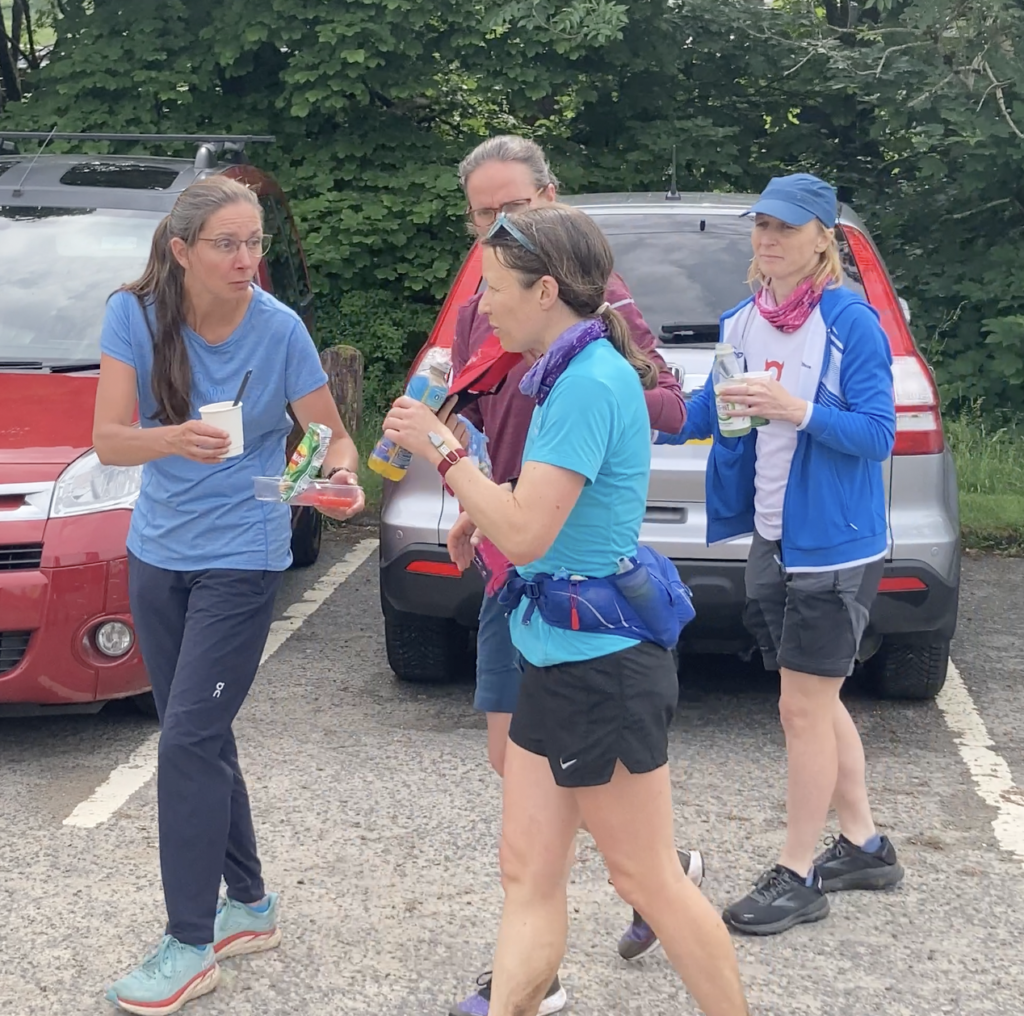
( Note Ally had a crew of three,. Her sister Kath (right), and Shyamala (left) and Dhavala Stott.)
AS. Looking at the splits of the race, and you just mentioned it there, it’s very apparent once you got the lead, and certainly past Beinglass, you didn’t change your position for the rest of the race. Usually, in a marathon or 10 km you’re seeing people throughout the race. In this race, you’re hardly seeing any runners, it seems, for about 70 miles.
AM. Yes, that’s something i hadn’t expected to happen and felt very different from any other race.
AS. Was that good or bad? Were you happy in your own little space, or were you thinking, “Oh! I wish I had someone to run with and have a little chat with for a bit.
AM. I had done most of my long runs on my own and so was quite comfortable and happy in my own little space. I used the skills that I’d learned and practiced during training to keep my mind switched on and also to stay in a good place when things were hurting. From my recces i had remembered features along the way and so would use these as small goals to reach. I checked in with my body now and again to let my crew know if there were any issues arising such as blisters, chaffing, or sore bits.
AS. Did you have any bad patches in the race?
AM. None at all, which is a complete change. The only slightly negative thought I had in the second half was, “How am I going to get up the Devil and the climb out of Kinlochleven?” My knees started getting a little hot because of the conditions, but I just told myself to get on with it and knew i’d get there.
AS Much was made before the race that it might have been hot and humid on the day. Did you find it was as hot as you thought it was going to be, or did you find the conditions in your favour on the day?
AM I was thirstier a lot earlier than I thought I would be. Fortunately, the sun wasn’t too strong, and it wasn’t out for long, but there’s that kind of mugginess so I changed my hydration plan. Initially I had two 300ml bottles. I knew from training that i would be comfortable for an hour, an hour and a half with two bottles. Then I started worrying as it got warmer. I thought , “I’m going to run out in the longer sections”. So I asked the girls if we change my pack and carry four bottles each section, and it just took that worry away. Fortunately I had that backup plan in place, just in case it was required.
AS. In terms of food, what was your favourite snack in the race?
AM. During my training run at Tyndrum I discovered Apple&Elderflower green flavoured juice. It really quenched my thirst and so we had four bottles of the green juice. They also gave me a pot of jelly and custard which felt like a big treat.
AS. Did you have much solid food?
AM. Yes, initially I did. As the race progressed however, solid food became difficult to swallow so we stuck with simple things like custard or jelly. I made sure i kept my fluids up, and had chews containing sugar,salt and fruit juice during every section.
AS. How do you recover from The West Highland Way? What will you do in the next few days in terms of recovery?
AM I’ll probably just go for long walks. I love walking in the hills and exploring. I quite like going to new places and just relaxing a bit. I’ve got a week off workand just plan to chill out and visit a few places and recharge the batteries.
AS. You train hard physically to get yourself physically fit. You’ve alluded to doing some mental drills. How does Ali’s inner runner cope with the level of training to get ready for 100 miles? That is no mean feat, whatever your level. Even if your sole aim is to finish these things, let alone trying to run them at a certain intensity. How do you cope with the weeks of training, building up to a race and keeping the motivation there. As well as dealing with the motivation of actually getting through a race?
AM. I think I have always been able to be disciplined and motivated enough. I also look forward to my runs to switch off, clear my head and be out in the open. There have been times when i haven’t enjoyed training and it feels like a chore, and that’s when i make small changes and find new routes and places to run.
Whether it’s raining or snowing outside i’ll head out, as the race could have similar conditions so you’re well prepared. It helps too when you have a schedule and a plan, and you know what goal you’re working towards.
AS. If you were chatting to a group of people who were thinking, “Do I want to run a 100 miler or the West Highland Way or whatever distance, what would be your best advice for someone thinking of moving up from say, 50 miles or 100K up to a 100 miler?
AM. It’s probably changed now. I would say get comfortable with being uncomfortable and work on the mind, the mental side of it. I think that can get to people a lot. I did practice that a lot during my training, and it has made a huge difference.
AS. How did you find the overall organisation and atmosphere of the race?
AM. Brilliant. Just Brilliant
AS. That’s it?….that’s it?
AM. It is just the family feel of the event that is so special.
AS. What’s next for Ali in terms of race?
AM. I have intentionally not booked anything else for the next couple of months because when I did that last year, I burnt out a little and over did things. I am going to do a bit more “recreational running in the hills. There are some local hill races I think I will go along to, like the Ochils 2000.
AS. Do you have any long-term ambitions still to tick off?
AM Yes. Some multi-day events, like Dragon’s Back or similar.
AS. I’m sure the right one is waiting for you there sometime.
Thanks so much for your time Ally.
AM Thanks for the chat
Josh Hewitson from Monument Media made a short 5 minute video collage of the event.
You can view it HERE.
PLEASE SHARE!
If you have enjoyed this post, do see our other ones HERE
If you are inspired by this or think someone else you know will be, please do what you have to do by sharing. You all know how these things work by now:-) You can also follow me on Twitter and Instagram @tarittweets
